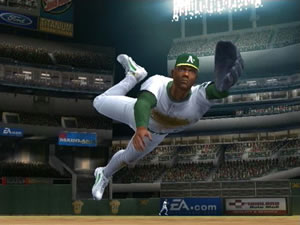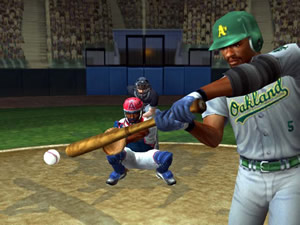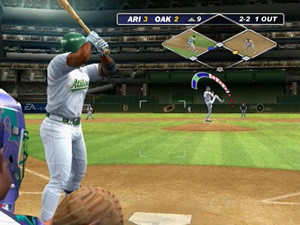Pitcher Perfect.
I’ve played more baseball games than Nolan Ryan. The upside is obvious, but the
downside is that it’s easy to forget exactly what kinds of improvements can and
should be made to the genre. As a result, reviewing baseball games is a bit like
reviewing the same game four times.
But not anymore. EA Sports pulled the plug on their Triple Play series
after a couple recent disappointments and built a brand new game from the ground
up. The resulting MVP Baseball 2003 makes some daring changes to the
genre, and the result is one of the best baseball games I’ve ever played.
MVP
2003 isn’t a simulation style game. It has no batting cursor, a less esoteric
franchise mode and very simplified fielding. Tack on the crispiest game engine
in baseball, a wicked pitching scheme and solid graphics and you’ve got a simple,
clean, fun baseball game.
The modes, though, are very ubiquitous and have been around forever. Tyrannosauruses
probably hunted and ate these modes way back in the day: Quick-play (exhibition),
Season, Post-Season, Home Run Showdown and Franchise. To be fair, the Home Run
Showdown is a little different from the typical Home Run Derby. You and a friend
can tee off in a timed battle to knock balls out of the park, with score subtractions
for fouls and whatnot. It’s a decent diversion. Everything else, though, is
basically what you’ve come to expect…except for the Franchise mode.
Franchise in MVP Baseball 2003 is less intricate than the one in Sega’s
excellent World Series Baseball
2K3. It lacks a couple common options, such as drafting generated players
and free agents, and in turn will likely disappoint management fans. To make
up for these shortcomings, the game rewards good play by building up your momentum,
which can determine if you’ll win a CPU simulated game. Franchise mode also
features an odd team-specific goal system. These differ from team to team; the
Yankees’ goal is to win the World Series a few times, while the Brewers just
have to put together a few winning seasons. It’s a bit strange, but also unique
to this game.
But frankly, if you’re a stat junkie and consider Franchise Mode the heart
and soul of a baseball game, then MVP 2003 is going to be a let down.
However, it doesn’t let down when it comes to the gameplay.
Take the pitching. At first glance, the pitching interface looks like many
other baseball games. There’s a hot and cold zone for each batter and each pitch
in a pitcher’s repertoire is mapped to a button. You’ve also got a diagram of
the bases with the baserunners’ positions on it, as well new corresponding picture-in-picture
displays above each base, giving you a much better idea of a runners’ lead.
You move the left analog stick and a ball cursor in the strike-zone moves correspondingly,
although it disappears after about two seconds. Like in every other game, the
rumble feature of your control pad will kick in as you hit/begin to leave the
edge of the strike zone.
However, once you select a pitch the fun really begins. Power and accuracy
are decided by a meter, using a system similar to the one for kicking in most
football games. Once you’ve selected a pitch, you hold down the corresponding
button and watch as a power-meter fills (which matches smartly with the pitcher’s
wind-up). Once the charge reaches its limit, you release the button and the
meter will rapidly diminish.
At the bottom of the meter is a green “accuracy’ window. If you manage to press the pitch button again when the extremity of the meter is within this window, your pitch will be accurate and go where you intended. Fail to stop the meter in this zone, and your pitch will lose some accuracy and its location will be telegraphed to the batter.
Each pitcher has his strong and weak pitches, which relates to the size of the accuracy zone. If a pitcher sucks at throwing curves, then the accuracy window will be tiny unless you charge the power-meter very little.
 The
The
whole thing works wonderfully. It’s a great new way to handle pitching, and
while it sounds a bit complex, it’s intuitive and fun.
Batting, on the other hand, has been reduced in complexity. You have no cursor;
rather, manipulating the left-stick affects what you try to do to the ball (pop
it up, pull it, ground it, etc.). As a result, the batting game depends entirely
on timing and a sharp eye. While very simple, I prefer this means of batting
to using a batting cursor. In most games, the cursor never moves smoothly. I
usually just wind up placing it over a spot on the plate and hoping one pitch
out of five or whatever makes its way there. MVP‘s scheme is much simpler
and more enjoyable.
Fielding is also easier as a result of reduced options. You don’t even get
to decide whether or when your fielder dives or jumps; they just do it automatically.
This can either be great or irritating, depending on the circumstance. A meter
similar to that of the pitcher’s charges when you tell a fielder to throw, which
determines its velocity, trajectory and accuracy. Although a bit redundant,
it’s a good addition.
The game engine moves everything along nicely. The animations are very good,
but what really defines the game is the tempo. MVP‘s gameplay is quick
and crisp. While the graphics aren’t as impressive as World Series Baseball
2K3, they are definitely adequate, thanks mainly to the animations. The
crowd and stadiums look fine if a little cardboard-y and the effects (like the
white trail on a ball in flight) are pleasing and tasteful.
The game sounds like baseball, with cool crowd chants and noises and a decent
announcing crew consisting of Duane Kuiper and Mike Krukow, who are witty and,
of course, repetitive.
While not the most detailed baseball game around (in fact, this game takes
a distinctly reductionist approach to many areas of its play), MVP Baseball
2003 is the most fun and exciting of the recent batch. The new pitching
system, quick tempo and cool new mechanics really sets this one apart from the
rest.

-
BEST PITCHING EVER
-
Clean, crisp gameplay
-
Decent graphics
-
Trimmed a lot of fat
-
Some people love the fat
-
And those people will prefer







